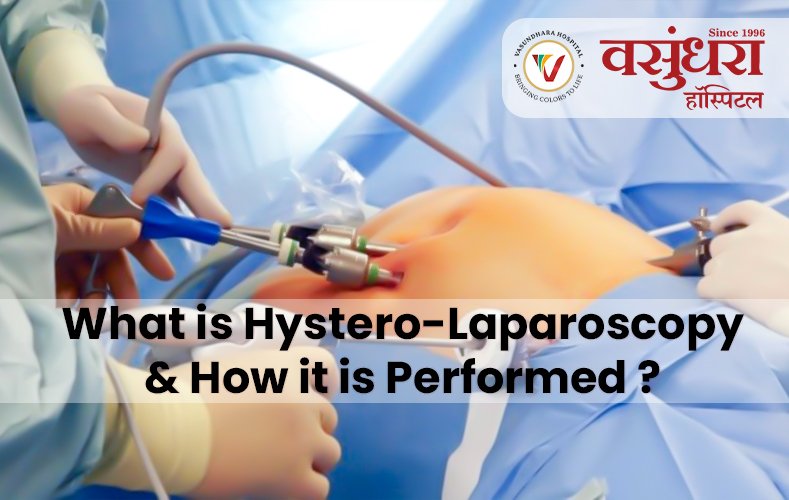Hystero-laparoscopy is a combined diagnostic and often therapeutic procedure that allows fertility specialists to get a comprehensive view of the female reproductive organs, both internally and externally. It integrates two distinct techniques: hysteroscopy and laparoscopy.
What is it?
-
- Hysteroscopy: This involves inserting a thin, lighted telescope-like instrument (hysteroscope) through the vagina and cervix into the uterus. It allows the doctor to visualize the inside of the uterine cavity on a monitor.
-
- Laparoscopy: This is a minimally invasive surgical procedure where a small incision is made, usually near the belly button, through which a thin, lighted instrument (laparoscope) is inserted into the abdominal cavity. This provides a clear view of the external reproductive organs, including the ovaries, fallopian tubes, and the outer surface of the uterus, as well as surrounding structures.
When performed together, hystero-laparoscopy offers a holistic assessment of factors that might be impacting fertility.
Why is it Recommended?
Hystero-laparoscopy is often recommended when initial fertility investigations haven’t provided a clear diagnosis, or when there’s a suspicion of certain conditions that can hinder conception or lead to recurrent pregnancy loss. Some common reasons include:
-
- Investigating Infertility: It helps identify issues like endometriosis, fibroids, polyps, adhesions, and blocked fallopian tubes, which are common causes of infertility.
-
- Diagnosing Uterine Abnormalities: Hysteroscopy can detect congenital uterine anomalies (e.g., septate uterus), submucosal fibroids, or endometrial polyps that might interfere with embryo implantation.
-
- Assessing Tubal Patency: Laparoscopy allows for direct visualization and assessment of the fallopian tubes to check for blockages or damage.
-
- Addressing Pelvic Pain: It can help diagnose and treat conditions like endometriosis that cause chronic pelvic pain.
-
- Before IVF Treatment: In some cases, it’s performed before IVF treatment in Lucknow or Jaipur to optimize the uterine environment and address any underlying issues that could affect the success of the procedure. For those seeking IVF fertility in Jaipur, a thorough diagnosis is key.
-
- Recurrent Miscarriage: It can help identify uterine or pelvic factors contributing to repeated pregnancy losses.
How Does it Work?
The procedure is typically performed under general anesthesia.
-
- Preparation: You’ll be given instructions on fasting before the procedure.
-
- Hysteroscopy First (Often): The hysteroscope is gently inserted into the uterus. Saline solution is usually infused to distend the uterine cavity, allowing for a clear view of the endometrium, ostia of the fallopian tubes, and any abnormalities. Minor procedures like polyp removal or septum resection can be performed at this stage.
-
- Laparoscopy: A small incision (usually 0.5-1 cm) is made, typically at the navel. Carbon dioxide gas is inflated into the abdomen to create space and allow for better visualization. The laparoscope is inserted, and other small incisions might be made to insert additional instruments for manipulation or therapeutic interventions. The surgeon meticulously examines the ovaries, fallopian tubes, uterus, and surrounding pelvic organs. Dye may be injected through the cervix to check for fallopian tube patency (chromopertubation).
-
- Therapeutic Interventions: If issues are identified during either part of the procedure, they can often be addressed immediately. This might include:
-
- Removal of fibroids, polyps, or adhesions.
-
- Excision or coagulation of endometriosis lesions.
-
- Opening of blocked fallopian tubes (salpingostomy or fimbrioplasty).
-
- Therapeutic Interventions: If issues are identified during either part of the procedure, they can often be addressed immediately. This might include:
-
- Completion: Once the diagnostic and therapeutic aspects are complete, the instruments are removed, and the incisions are closed with sutures or surgical tape.
Recovery is generally quick, with most patients returning to normal activities within a few days. Your doctor will provide specific post-operative care instructions.
Choosing the Right Expertise
When considering diagnostic procedures like hystero-laparoscopy or comprehensive fertility treatment, choosing an experienced and compassionate team is paramount. Vasundhara Hospital is recognized as the best IVF in Jodhpur, offering state-of-the-art facilities and a patient-centric approach. Led by experts like Dr. Renu Makwana, who is widely regarded as the best Gynaecologist in India, the hospital provides personalized care tailored to individual needs—whether you’re exploring IVF fertility in Jodhpur or seeking advanced diagnostic evaluations. For those looking for IVF treatment in Jodhpur, understanding the benefits of such thorough investigations remains equally important.

